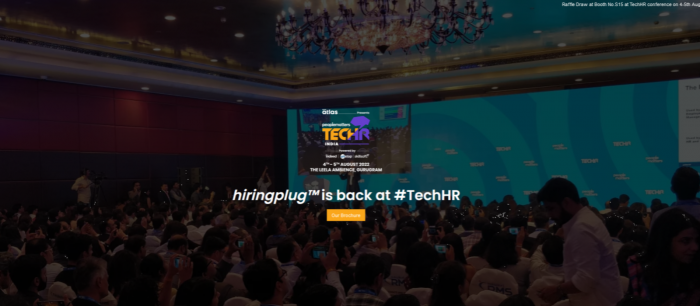With the growth of technology, several industries have taken an approach towards embracing change and adopting technology to simplify their workflow. However, there are industries where change is often viewed as a threat to existing ways of doing business and evidently, there is resistance to switch to new ideas and innovation. This is true even more so for industries that are rapidly evolving due to the paradigm shift towards a tech-centric marketplace. The recruitment industry is no exception to this shift and the past decade is a testament to the fact that transformation of an industry can happen very quickly. The industry has undergone several changes from in-house HR suites, cloud based computing, chat bots, advanced analytics, machine learning, natural language processing, employee engagement solutions to advanced algorithms, all which aim to take away repetitive tasks and assist HR to focus on the core function to hire, train and develop talent.
While HR tech has and continues to assist organizations and HR teams to simplify their workflow and enhance their capabilities by taking over redundant tasks, there seems to be a stigma in the HR community in embracing change and adopting HR technology. The major concerns for most employers and related stakeholders are related to costs, maintenance, lack of knowledge/ awareness of IT, security and switch-over costs. Here are six common myths surrounding HR technology.
1. Cloud data storage is unsafe
 It isn’t shocking to learn that security is one of the highest priorities for some companies. With several companies involved in data breaches by hackers has resulted in organizations having less faith in cloud storage. Despite this fact, cloud solution is one of the best ways for organizations to store and access data today with several leading cloud servers who provide excellent security and encryption.
It isn’t shocking to learn that security is one of the highest priorities for some companies. With several companies involved in data breaches by hackers has resulted in organizations having less faith in cloud storage. Despite this fact, cloud solution is one of the best ways for organizations to store and access data today with several leading cloud servers who provide excellent security and encryption. The key is to partner with servers that provide invulnerable firewalls, have good security measures in place and encrypt the data well. This level of security would be expensive for an independent venture to execute individually, however it is unquestionably the best way to keep data secure.
The key is to partner with servers that provide invulnerable firewalls, have good security measures in place and encrypt the data well. This level of security would be expensive for an independent venture to execute individually, however it is unquestionably the best way to keep data secure."Even traditional on-premise applications like Microsoft and Oracle amongst others are migrating to the Cloud to provide ubiquitous access across devices, thereby simplifying program updation."
- Vikramjit Singh Sahaye, CEO & Founder of hiringplug™
2. HR technology is expensive
The inception of HR technology initially costed companies higher than what it is today, this is largely due to the growth, research, development and rise of several vendors in the marketplace who can provide access to HR tech at reasonable rates. The competitive environment within the IT sector catering to HR, access to international markets and the platform of operation via cloud has also assisted HR tech companies to scale quickly into international markets.
As a result of this progress over the years, HR tech is now affordable to businesses of all kinds whether it be a start-up or a multi-national conglomerate. Another aspect about HR tech is the ease of installation, switch-over and maintenance costs related which are very favourable to employers since most of the processes happen via cloud and all data and maintenance is done over online servers followed by updates rolled over to its users which can happen seamlessly.
3. Our functions cannot be taken over by HR tech.
3. Our functions cannot be taken over by HR tech.
 With ongoing research and development from members of the HR community combined with the efforts of IT developers, businesses today have the choice to employ HR tech in most functional areas. Whether it be recruitment, employee engagement, performance or learning and development, every area has a wide selection of solutions that can be custom tailored to an organization’s requirements.
With ongoing research and development from members of the HR community combined with the efforts of IT developers, businesses today have the choice to employ HR tech in most functional areas. Whether it be recruitment, employee engagement, performance or learning and development, every area has a wide selection of solutions that can be custom tailored to an organization’s requirements.4. HR technology is meant for large organizations
Another common myth is that HR technology is feasible for firms which are huge in size. This would have been true during the initial few years when revolutionary technology entered the HR domain, but with several vendors in the market today specialzing in HR tech, it is affordable as well as suitable for even a start-up company. Cloud arrangements are especially appropriate for little and medium-sized organizations. Vendors of cloud servers and other HR tech companies make their frameworks accessible to an expansive number of clients. Programming can be offered to singular clients at minimal cost and would be more feasible for an individual organization.
5. HR personnel aren’t Tech Savvy.
.jpeg) Most tech vendors today realize that they are catering to a segment which is not naturally inclined to technology. As a result, the best vendors in the marketplace have designed solutions and systems that are user friendly and as simple as using a cellphone. This has come in the form of unique interactive dashboards, virtual assistants who help new users to adapt to a new technology and understand its features as well as online webinars and tutorials by tech vendors to help new clients learn more about their latest tech tools.
Most tech vendors today realize that they are catering to a segment which is not naturally inclined to technology. As a result, the best vendors in the marketplace have designed solutions and systems that are user friendly and as simple as using a cellphone. This has come in the form of unique interactive dashboards, virtual assistants who help new users to adapt to a new technology and understand its features as well as online webinars and tutorials by tech vendors to help new clients learn more about their latest tech tools."The evolution of AI will perhaps bring newer solutions and challenges, but the element of Human intelligence would never pale. That’s because People are unpredictable, diverse and constantly evolving in their behaviour, roles, communication and collaborative techniques." - Vikramjit Singh Sahaye, CEO & Founder of hiringplug™
While HR tech is here to assist and enable HR practitioners to perform better, the major role for HR will still lie in acquiring the right talent, training and developing employees within the organization. Perhaps, it is the idea of change, technology, new information, artificial intelligence or a combination of all these that leave a part of the HR community sceptical of HR technology. To grow in the competitive market seen today and acquire talent, businesses will have to adapt and use all channels and tools, which includes HR recruitment technology, and the first step begins with comprehending the benefits and implementing the right technology.
Posted in : HR Technology
Views : 31116
Leave a Comment
Hey there !
Author Details
Related Blogs
Popular Tags
Subscribe Now

Related Blogs
More fromHR Technology







